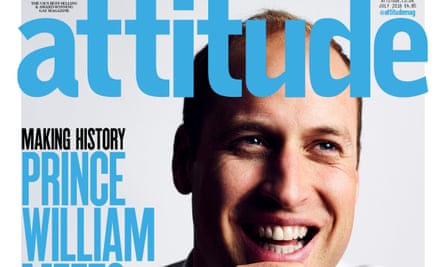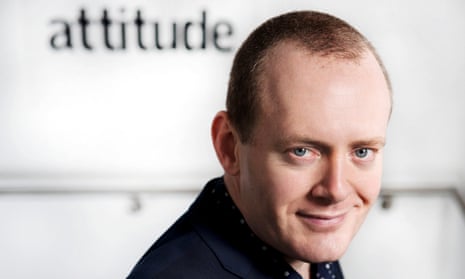Less than two weeks ago, the new issue of Attitude went to press. It would be its editor’s last edition – Matthew Todd, who has worked for the gay magazine since 1996, told his staff in January he felt it was time to move on. And his final issue would be a joyous, thunderous one that would get attention around the world; its cover star would be Prince William, the first time a royal would appear on the front of a gay magazine. In it, he would say “no one should be bullied for their sexuality”, and recognition of homophobic bullying by such a famous figure would, hoped Todd, put the issue firmly into the spotlight.
Four days later, a man shot 49 people dead at a LGBT bar in Florida, and wounded many more. Todd’s face seems to drain of colour at the mention of it. We sit in the offices of Attitude – it has a small circulation but it punches well above its weight in terms of influence – where Todd has been editor since 2008.
It wasn’t just the atrocity that distressed him, but the way parts of the media covered it. Or rather, didn’t. He says he found it “shocking” that the Daily Mail didn’t put the massacre – the worst terrorist attack in the US since 9/11, and its worst mass shooting – on its front page. “It perpetuates this message to young people – that your life is not as important as other people’s,” he says.
The reluctance of some people to label the attack homophobic was dismaying. Todd watched the Sky News paper review, where Guardian columnist Owen Jones walked out after the host and a fellow guest appeared to downplay the killer’s homophobic motivation for the attack. “I was screaming at the TV, I was so annoyed,” says Todd. “To not say what it was, which was homophobic. I wonder whether there are some people in the media who are so uncomfortable about acknowledging the damaging effect of homophobia because so much of the media has perpetuated it, and sometimes still does.”
This was the thinking behind getting Prince William, who he first approached in 2011, to support Attitude’s ongoing campaign against homophobic bullying – that it would get attention and make others more likely to take it seriously. “For him to say ‘this is important, and it’s something I care about’ is huge. It frustrates me that the mainstream doesn’t talk about it,” says Todd.

There are lots of reasons, he says – a lack of understanding, few LGBT people in powerful positions in the media, but also a reluctance within the gay community to talk about it. “I’ve noticed in my career at Attitude,” says Todd, “that talking about bullying and experiences at school was so painful that people didn’t feel comfortable doing it.”
Todd has written a book, Straight Jacket, in which he documents his own childhood experiences, and the long-term mental health and addiction issues he has suffered; he is also using it to call for a government inquiry into the experiences of LGBT children at school. A recovering alcoholic who had stopped drinking in 2009, as soon as he started writing the book he began drinking again (he has since stopped).
Growing up in south London, Todd became aware he was gay when he was about 11 – it was the mid-80s, Section 28 was just around the corner, and it was a frightening time to have such a realisation.
“The media was portraying gay people as perverts and paedophiles and you were going to die of Aids. My parents were fantastic but they didn’t understand. I heard negativity at home, and homophobia everywhere.”
There was this idea in the tabloids that gay people were predatory adults, “trying to recruit young people. There was no acknowledgment we had been kids. I remember being absolutely terrified about feeling different. I didn’t want to be gay, I cried myself to sleep night after night, I thought about suicide.” Had he not come out at 16, he says, he would probably have ended his life. “I was heading for collapse.”
Not that coming out solved everything. For the next 20 years – even while projecting an image of stability – Todd’s mental health suffered, and for years he was abusing alcohol, turning up to shoots drunk, having to make excuses and go home.
He went into recovery and a therapist told him, “I’m not surprised you’re fucked up, you’re gay”. “It was a very confrontational thing to say, but then he went on to explain that the problem was not that I was gay, but that I’d had the experience of growing up in a society that invalidates you at every turn. That was like a lightbulb going on.” He wrote about it in the magazine, attracting its biggest ever response from readers. Todd stresses there are “lots and lots” of very happy, confident gay people – and recent strides in equality have made a huge difference to the lives of LGBT people – “but it does seem like there are a disproportionate number of people who are still struggling.”
His own recovery is ongoing, he says, and it feels right to leave the magazine after 20 years. After he told his team, “I suddenly went into a little bit of a panic. This is an amazing magazine, an amazing job and I’ve had the most incredible experiences. But I want to do other things.” He wrote a play, which was performed in London and Australia in 2005, and he’d like to revisit that, among other projects.
Todd will remain at Attitude as editorial director on a part-time basis to steer the magazine, and he says he is excited to see where it heads under a new editor. He is buoyed by the younger generation of LGBT people “who perhaps, unlike some in the older generation, aren’t going to accept a certain amount of advancement, and think they deserve equality. I’ve felt over the last few years there has been a repoliticisation.”
He feels proud to have played a part in that. “Attitude was started in 1994 as an expression of the new confidence and empowerment that was coming after the 80s. As a young man I was really excited about that. I think it’s evolved and I hope I’ve made the magazine a little bit more policitised.” Under his editorship, Tony Blair, David Cameron and Ed Miliband have all appeared on the cover – not, mercifully, shirtless in the magazine’s typical oiled-six pack cover-star style. “In the past year we’ve been moving away from them,” says Todd, with a smile.
He has had letters and emails from young people who say the magazine has given them confidence, including the courage to come out. Recently, a young man told him he’d only learned about HIV through the magazine. Todd shakes his head in exasperation. “I mean, it’s amazing,” he says. “But it’s appalling that that’s the situation. The government won’t bring in mandatory sex and relationship education and I think they are responsible for young people not being educated about HIV, who go out and catch HIV. It’s really shocking.”
Clearly recent events and their aftermath – from the missteps by the media to the sickening homophobic tweets – prove there is a huge way to go. “It’s distressing. Frightening,” says Todd. “I noticed people at the vigil [in London for the victims of the Orlando shooting] were chanting ‘we’re here, we’re queer, we will not live in fear’ which I thought was really powerful. Despite these terrible, terrible things, the overall movement is positive and we’re moving forward.”
Curriculum vitae
Age: 42
Education: Wilson’s School, Wallington; Kingston University (sociology)
Career: 1995 office junior, LGBT rights organisation Stonewall 1996 editorial assistant, Attitude, then freelance journalist 2005 wrote the play Blowing Whistles 2008 editor, Attitude
